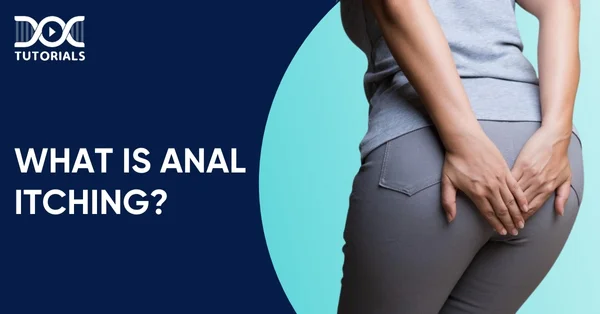Anal Itching NEET PG Guide | Causes, Symptoms, and Treatment

Pruritus ani, or anal itching, is a common but frequently embarrassing condition that causes you desire to scratch the area around your anus. It can be painful and make you feel bad, but it usually doesn’t signify you have a serious health concern. You can handle it on your own, and if you need to, you can get medical help.
People can prevent getting sick again and feel better if they know what causes it, what puts them at risk, what the symptoms are, how to identify it, and what remedies are available.
For more information, keep reading!
What is Anal Itching?
Anal itching happens when the skin around the anus, which is the opening at the end of the digestive tract where waste leaves the body, becomes irritated and painful. Itching in the anal area can be slight or severe, and it may also hurt, burn, or turn red.
The discomfort usually gets worse at night or when it’s hot and humid, and scratching can make the skin feel even worse, which makes the itching worse. Anal itching is a symptom, not an illness, and it can have many different causes.
What Makes Your Anus Itch?
Several things might make your anus itch. These things are usually divided into two groups: primary (which have no known cause) and secondary (which are caused by another condition).
Here are some of the most common reasons for anal itching:
- Things That Bother You
Things including what we eat and wear, how we clean ourselves, and the items we use might irritate the skin around the anus. Sweating, wearing tight clothes, cleaning too much, and being around dampness for a long time from loose stools can all make the problem worse.
- Infections
Too much Candida fungus can cause yeast infections, which can make the area around the anus or vagina itch and pain. They can move from one site to another and commonly show up after antibiotics are taken. Some bacterial illnesses might also make you itch in the same manner.
- Skin Problems
Psoriasis and atopic dermatitis are skin conditions that can affect any region of your body, even the area around your anus. You might feel uncomfortable and itchy because of rashes and inflammation in this area caused by allergies.
- Haemorrhoids
Haemorrhoids are blood vessels that have gotten bigger and can be inside or outside the anus and rectum. If you have significant external haemorrhoids, it can be hard to clean up after going to the toilet. Bleeding or leaking from the rectum can happen with internal haemorrhoids. This can make the skin around them red and uncomfortable.
- Diseases that Affect the Whole Body
Sometimes, anal itching is a sign of diabetes, thyroid problems, liver disease, or inflammatory bowel disease.
- Dietary Factors
Spicy foods, coffee, alcohol, and some medicines can make the anal area feel bad.
- Wetness
If you sweat, have diarrhoea, or are incontinent and stay wet for a long time, you are more likely to get an infection or have irritation.
Risk Factors for Itching in the Anus
There are a number of underlying problems and outside variables that can make anal itching more likely. These are:
- Pinworm infections, which are very common in kids, are a typical cause of anal itching because the parasites are active in the anal area.
- People with chronic diarrhoea or faecal incontinence often have skin that is exposed to moisture and irritants for a long time. This can cause the skin to break down and become irritated.
- People with diabetes or a weaker immune system (due to HIV or immunosuppressive therapy, for example) are more likely to have infections, especially fungal ones like candidiasis.
- Not cleaning properly or scrubbing too hard can break down the skin’s natural barrier and irritate it.
- Skin conditions like eczema or psoriasis can make the skin more sensitive and cause it to itch in sensitive regions like the anus.
These elements may work alone or together, so it’s crucial to find and fix the main problem in order to get the best relief.
Common Signs of Anal Itching
A persistent or repeated impulse to scratch the anal area is the most common sign. But there may be other signs as well, such as:
- The skin around the anus is red and irritated.
- A feeling of scorching or stinging.
- Localised swelling or the emergence of a rash.
- Skin that gets thicker, cracks, or breaks by scratching it over and over again.
In more severe or long-lasting occurrences, ulceration or slight bleeding may be seen.
Symptoms can change over the day and are usually severe at night. Scratching may provide short-term relief, but it usually makes the inflammation worse, which is called the “itch-scratch cycle.”
Finding Out What is Causing Anal Itching
Healthcare providers usually start with a full history and physical exam to figure out what is causing anal irritation. Hygiene habits, recent illnesses, eating habits, and any topical products used in the area are some of the most important things to look at.
Some common steps in diagnosis are:
- Look At It: A careful look at the anal area can help find problems that are easy to see, like rashes, haemorrhoids, fissures, or evidence of a local infection.
- Stool sample analysis is very crucial for finding parasitic illnesses, such pinworms, especially in kids.
- Skin swabs or scrapings are useful for finding bacterial or fungal illnesses through lab tests.
- Blood Tests: Suggested when a systemic ailment, like diabetes or liver disease, is suspected.
- Anoscopy or Sigmoidoscopy: Used only sometimes to see within the anal canal and rectum for problems like haemorrhoids, abscesses, or tumours.
A diagnosis is often made solely based on clinical history and exterior examination. But if the cases keep coming back or are unclear, these further diagnostic methods may be needed to rule out illnesses that aren’t as clear.
What are the Ways to Treat Anal Itching?
The treatment of anal itching varies on what caused it, but in general, the goal is to ease the symptoms and keep them from coming back.
- Changes to your lifestyle and self-care
- Keep the area around the anus clean and dry. After using the bathroom, wash it gently with water and pat it dry.
- Stay away from soaps, wipes, and toilet paper that have scents or colours.
- Wear cotton pants that are loose and airy, and stay away from tight clothes.
- Don’t scratch; keep your nails short to protect your skin.
- To protect the skin, use a barrier lotion like zinc oxide or petroleum jelly.
Anal Itching: Medical Treatments
To effectively treat anal itching, you need to find and treat the cause and the symptoms. Medical care usually includes:
- Topical corticosteroids are used to temporarily relieve inflammation and irritation. Avoid using it for a long time because it can make your skin thinner.
- Antifungal or Antibiotic Creams: These are given when a fungal or bacterial infection is found and they work on the specific organism that is causing irritation.
- Oral antihistamines can help with extreme itching, especially at night when the symptoms get worse.
- Treatment of Underlying Issues: To get long-term relief, it’s important to treat related illnesses like haemorrhoids, anal fissures, or systemic disorders (like diabetes).
- Specialised Procedures: In rare and long-term cases where traditional therapies don’t work, methods like methylene blue injection (sometimes called anal tattooing) may be looked into to break the cycle of itching and scratching.
Most people get long-term relief with the right treatment and self-care. But if the symptoms don’t go away or get worse, you should see a doctor for a more accurate diagnosis and personalised therapy.
Common Questions About Anal Itching
- Can feeling stressed or anxious make your anus itch?
Yes. Stress and worry are two emotional elements that can make anal itching worse or even cause it in some people. This pain might make it much harder to sleep and add to the stress on your mind.
- Is it possible to catch anal itching?
The feeling of itching is not communicable. But some underlying causes, such as pinworms, fungal infections, or bacterial skin diseases, can be passed on to other people, especially in places where people are near to each other.
- Do some meals make anal itching worse?
Yes. Spicy foods, coffee, alcohol, and acidic or processed foods can all irritate the digestive tract and make anal itching worse, especially in people who are already sensitive.
- Can you use lotions that you can get without a prescription to feel better?
Hydrocortisone or zinc oxide lotions that you can buy without a prescription can help for a short time. But you shouldn’t take steroid creams for a long time without talking to a doctor first, because they can hurt your skin over time.
- When should I go to the doctor for anal itching?
If the itching doesn’t go away, is really bad, or is accompanied by other symptoms like bleeding, pain, discharge, or visual evidence of infection (like pus, swelling, or fever), you should visit a doctor. A doctor can help figure out what’s wrong and give you the right treatment.
Final Thoughts
Itching in the anal area is a typical problem that can be treated. Most people can find relief and stop the problem from coming back by following good hygiene, making changes to their lifestyle, and getting the right medical treatment when needed. If your symptoms don’t go away or get worse, you should consult a doctor to rule out any underlying diseases and get the right care.
Are you a medical student who wants to know everything there is to know about anal itching and other related subjects for your NEET PG exam? DocTutorials can be the best guidance for you. Our NEET PG course is meant to help you develop your career by giving you the best tutorials, short video lectures, evaluation programmes, and more.
Please get in touch with us right away!
Latest Blogs
-

NEET SS Exam 2024: Analysis, Key Dates, Counselling
The NEET SS 2024 exam kicked off on March 29, 2025. Over two days and two slots, candidates across 13…
-

NEET PG Registration 2025: An Essential Guide For Exam Prep
The NEET PG registration, which is conducted online, is a crucial step in the exam process. Filling out the NEET…
-

NEET PG Syllabus 2026: A Must-Have Complete Guide for Exam Success
The NEET PG Syllabus acts as one of the foundation stones for aspiring postgraduate medical students like you who are…




